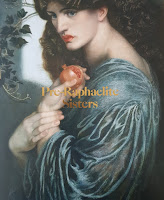I had the great pleasure of visiting the The Pre-Raphaelite Sisters exhibition at the National Portrait Gallery. It's been a while since my last visit here, but London was busy despite the rain, the gallery was espacially busy, probably because of the rain, and the restaurant was full of people keeping out of the rain. Luckily I'd booked in advance.
The exhibition presents the work of the women who are mostly known as the subjects of the paintings of the pre-raphaelite brotherhood. But in their own way these women produced works of art just as compelling and stunningly beautiful as their male counterparts. There are works by 12 women in total including Christina Rossetti, Effie Gray Millais and Joanna Boyse Wells.
During the course of my afternoon there as I meandered from room to room, I had to marvel at the colours of the paintings, the detail included, the careful positioning of the subjects to tell the story of the picture. One of my favourite little items is a simple water colour, undated but attributed to Effie Ruskin - subsequently Millais once her marriage to Ruskin was annulled. What I especially like about the picture is that, as I look at it, I feel as though I can step onto the path and therefore into the garden itself. I never tire of art that conveys that impression. Taking a few steps back, I can see and understand the science and form of the composition and I have to ponder whether the artist specifically chose that composition or just came upon and thought it would make a great picture. In this particular room there are also drawings that became full portraits and it is fascinating to see the progression from pencil and paper to framed oil on board or canvas.
 In the room for Joanna Boyce Wells, the face depicted in the painting, Thou Bird of God, catches my attention immediately. The eyes of the subject stare out at you and invite you, or maybe compel you to come in. In this room I can feel her eyes resting on me benignly. It's almost as though she is making sure that I don't miss a single item on display. My catalogue for the exhibition tells me that this particular picture dates from 1861 and is on loan from a private collection. I have to say, I greatly envy the owner who can look into those eyes every day whenever he, she or they wish. Luckily for me, this image is reproduced on a set of Christmas cards in the gallery shop. I can take a copy of her home with me. It won't be the same as the real piece of art, but it will be enough and if I decide to have the card framed, I already know exactly where I shall hang my copy.
In the room for Joanna Boyce Wells, the face depicted in the painting, Thou Bird of God, catches my attention immediately. The eyes of the subject stare out at you and invite you, or maybe compel you to come in. In this room I can feel her eyes resting on me benignly. It's almost as though she is making sure that I don't miss a single item on display. My catalogue for the exhibition tells me that this particular picture dates from 1861 and is on loan from a private collection. I have to say, I greatly envy the owner who can look into those eyes every day whenever he, she or they wish. Luckily for me, this image is reproduced on a set of Christmas cards in the gallery shop. I can take a copy of her home with me. It won't be the same as the real piece of art, but it will be enough and if I decide to have the card framed, I already know exactly where I shall hang my copy. A very happy two hours later and I grab a coffee and begin leafing through details of the lives of the women and their art set out in the book. I want to preserve the visual feast of colour for as long as I possibly can whilst I'm still in the relative peace and quiet of the gallery. My table is in a corner out of the way and, as I'm sat with my back to the room, I'm hoping I will be left in peace. However, I can't stay for too long as I need to catch my train home. But at least I will have my catalogue...
A very happy two hours later and I grab a coffee and begin leafing through details of the lives of the women and their art set out in the book. I want to preserve the visual feast of colour for as long as I possibly can whilst I'm still in the relative peace and quiet of the gallery. My table is in a corner out of the way and, as I'm sat with my back to the room, I'm hoping I will be left in peace. However, I can't stay for too long as I need to catch my train home. But at least I will have my catalogue...
The exhibition is running through until January next year and is well worth a visit. You can access the exhibition and book tickets using the link at the top of the page...







